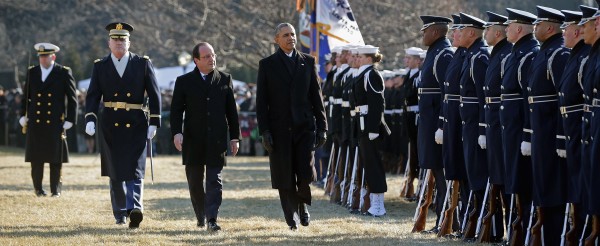U.S. Military Presence in Europe Needs to be Reassessed
Chip Somodevilla/Getty Images
French President Francois Hollande and US President meet for a military review at the White House, in Washington, DC, on February 11, 2014. (Pool photo by Chip Somodevilla courtesy of Getty Images via Abaca Press/MCT)
January 21, 2015

The Pentagon announced on Jan. 8 that it would be ending operations at 15 sites in Europe, including an air base in Britain and several facilities in Germany, a move projected to save $500 million annually. From the east of England to the Portuguese Azores off the coast of Africa, there will be cuts ranging from hundreds to thousands of personnel while others are to be rebased in Germany. That still leaves nearly 64,000 U.S. troops in Europe and dozens of bases, mostly in Britain, Germany and Italy. World War II ended 70 years ago, and the Soviet Union fell 24 years ago. This begs the question: What is the U.S. Army still doing in Europe?
The deeper question, in actuality, is whether or not our alliance with Europe serves our interests. Let’s assume for now that the answer to that question is yes. The United States and European countries nominally share similar values (like “freedom” and “democracy”) and most are republics ruled by center-left governments. Sounds reasonable enough. However, while in 2013 we spent almost a fifth of our budget on “defense,” European countries typically spent on the lower end of the single digits. Granted, the medical facilities at our bases in Europe have saved the lives of countless soldiers flown in from Iraq and Afghanistan over the years, and I think those are worth the cost. However, we aren’t paying for that large standing army (by contemporary standards) in Europe just because we can; we are footing the bill and supplying the manpower for the army they should have themselves. Europe has a much larger population than the United States, and is not the shattered continent of the late forties. They can field their own troops and collectively defend themselves without us being both spear and spearhead.
This is a lousy deal, and it’s also ridiculous. We don’t need troops standing at the border of East Germany to let the Soviets know we are prepared to defend Atlantic democracy and capital. Now, some of you may be thinking, “Well what about Putin’s Russia?” The media says that Putin is Hitler (especially after his defense of the 1939 Nazi-Soviet non-aggression pact) and wants to invade Europe. Whether or not Putin is a fan of small moustaches and Hugo Boss suits, as it turns out, we have had a powerful deterrent against Russia for decades. We keep them in silos in the Midwest and on submarines that are constantly trawling the world’s oceans. They’re called nuclear weapons. They have made battles between large land armies obsolete. In between the medal polishing and saber-rattling sessions at the Pentagon and in Congress, someone should really run this by people. In other news, the most recent European conflict is between Russia and Ukraine, with the former resting on a vintage wine cellar of nukes and the latter having given up the stockpile it inherited from the Ukrainian SSR nearly 20 years ago. There might just be something behind the pattern that nuclear-capable countries haven’t fought each other, and that much of Europe is allied with the nuclear-powered Anglo-Franco-American military apparatus.
So for now let’s assume that our troops in Europe are not a deterrent presence. Since a land invasion from Russia is not a threat to NATO-allied Europe—sorry Ukraine—what purpose should the U.S. Army have in Europe? To answer that question, we should first ask, “What are the modern challenges to the security of Europe?” If recent events are any indication, the answers are terrorism, state-sponsored cyber-attacks and the naval migration of hundreds of thousands of destitute people from North Africa and the Middle East into Southern Europe. What is our costly and professional-looking land army going to do about those issues?
Terrorism would seem to be the most pressing of these following the recent Islamist attack on the offices of Charlie Hebdo and the ongoing movement of European-origin jihadis in and out of Syria. Another fun fact is that the 9/11 attacks were planned in Hamburg, Germany. Maybe the Department of Defense ought to put more money into combatting credible threats to our European partners (and ourselves) than maintaining 64,000 troops in comfy barracks. Just food for thought.
Of course, we are still assuming that our alliance with Europe serves our interests—it certainly serves theirs. I think that is too big of a question to address here, but let us remember that for a very long time, we had something called the Monroe Doctrine, a foreign policy principle held by the U.S. that no European power should interfere in our hemisphere. Doesn’t sound very friendly, does it? And of course, the United States violently struggled against our now-ally Britain in the past for independence. Our leaders would do well to remember that neither alliance nor enmity are permanent. 2015 is not 1945. If having troops in Europe has a negligible impact on our own security, why bother?













